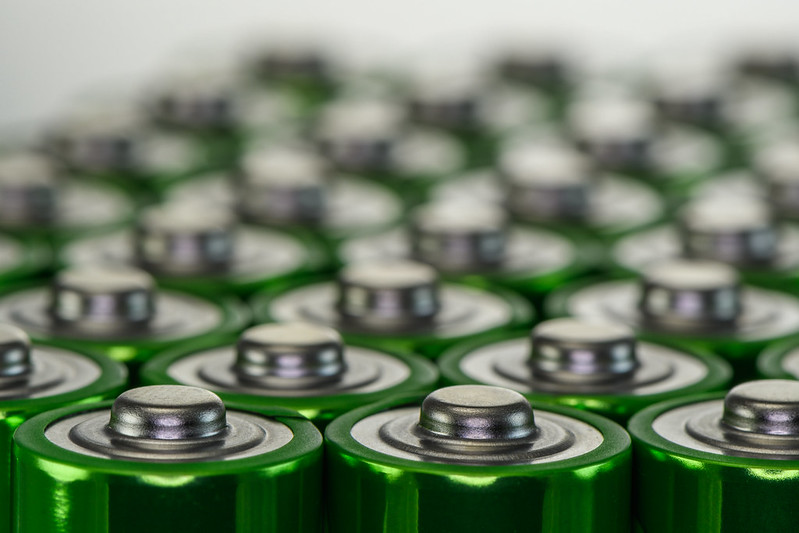As portable electronic devices become more prevalent in our modern society, the requirement for larger and more efficient batteries also grows. Traditionally, small portable e-devices as well as larger e-cars and renewable power stations have depended on tried and tested lithium-ion based electrical storage technology. Despite being almost ubiqitous, these also come with significant downsides, many of which impact the environment and the human rights of those people who work to produce those batteries.
Now, researchers at the Chalmers University of Technology in Sweden are developing a new type of aluminium battery which could reduce the world’s dependency on lithium-ion based ones. As well as being arguably better suited for electrical storage and transfer, the researchers suggest aluminium batteries will also have much smaller ecological impact.
What is the environmental impact of lithium?
There are several reasons why lithium-ion batteries are not ideal from an environmental perspective. Firstly, they are dependant on lithium, which although common, does not appear in element form naturally. It can only be obtained via expensive mining operations, or more commonly through extraction from mineral springs and brine pools. Although it is present in seawater in large quantities, no commercial viable method of seawater extraction has been developed.
Lithium mining operations have been linked to water contamination and livestock and fish deaths in Tibet, while although evaporation extraction from brine pools and salt flat does not immediately present as much damage as traditional mining, they do require vast amounts of water. In the long run, this could lead to water shortages in some of the driest regions on Earth.
Much of the world’s lithium deposits are hidden under the salt flats of the so-called Lithium Triangle located in Bolivia, Chile and Argentina. The lithium rich brine is pumped to the surface and evaporation, a process that requires 500,000 gallons of water per tonne of lithium. In Chile, for example, 65 percent of all water is used in mining, leaving scant resources for agriculture and other sectors. Needing to ship much of the world’s lithium from just one small geographic area all around the world also entails high costs and fuel use for transportation, merely adding to climate damage.
Additionally, lithium-ion batteries also require cobalt, a valuable metal present in many countries in the Global South, such as the Democratic Republic of Congo. The growth in demand for cobalt from the technology sector has resulted in widespread, often unregulated, extraction in dangerous and illegal conditions. Not only does this result in many direct deaths, but the surrounding areas are also often contaminated due to mining operations.
Are aluminium batteries an eco-friendly alternative to lithium-ion?
The battery developed by Chalmers University, however, is not dependant on such rare elements and specific minerals. Aluminum, for example, makes up 8% of the Earth’s crust, making it the third most common element and the most common metal. Due to this, it is the most widely distributed and used metal in the world and is extracted on practically every continent. Although aluminium mining and extraction does cause environmental damage – especially in regards to the greenhouse emissions of smelters – Chalmers University physicist Patrik Johansson believes it is a more environmentally-friendly alternative to lithium:
The material costs and environmental impacts that we envisage from our new concept are much lower than what we see today, making them feasible for large-scale usage, such as solar cell parks, or storage of wind energy, for example.
Aluminium batteries are not entirely new, buz previous models used graphite as a cathode, which means they were often a more expensive and sometimes less efficient battery compared to lithium-ion based ones. The Chalmers team behind the new version has swapped out this graphite cathode for an organic carbon-based compound called anthraquinone. The use of aluminum and anthraquinone allows the new type ofbattery to have twice the energy density of previous ‘state of the art’ aluminium batteries.
Despite these developments, there is still a lot of work to be done to turn the Chalmers battery into a viable commercial alternative. Although their research has resulted in promising conclusions, more work is needed to improve the internal chemical mix of the battery. They also wish to also further “clean up” the interior of their creation. Chalmers reseacher Niklas Lindahl explained:
Because the new cathode material makes it possible to use a more appropriate charge-carrier, the batteries can make better usage of aluminium’s potential. Now, we are continuing the work by looking for an even better electrolyte. The current version contains chlorine – we want to get rid of that.
In this sense, it might be some time before their aluminum batteries are replacing our older lithium-ion ones, but the team is convinced that their discovery has the potential for large scale applications in the future, including storage of solar and wind energy. In any case, this research stands to highlight an often overlooked element of the ‘green tech revolution’. Many electrical devices, from mobile phones to e-scooters and electric cars, require batteries for their use. And devices become larger and more complex, so too must the batteries, requiring more lithium and more cobalt, often at lower costs. This in turn results in more extensive mining and more intense methods of extraction, often resulting in increased conflict, environmental contamination and human rights violations in the countries where these minerals are found.
It’s worth remembering that Europe’s eco-friendly green tech salvation often comes at the cost of those living in the countries of the Global South. Hopefully, the aluminium battery developed by the Swedish team will help reduce the ecological impact of the West’s technological appetite.








